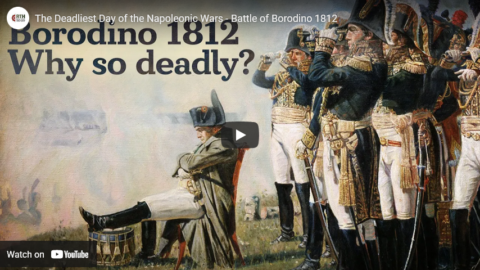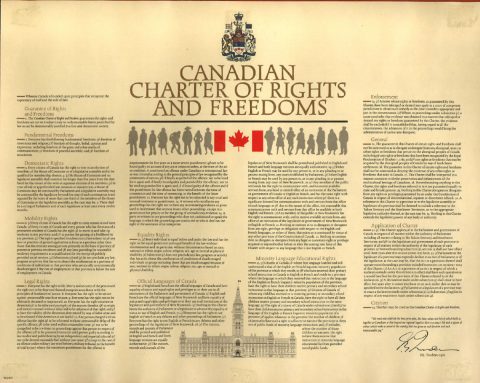Real Time History
Published 5 May 2022Sign up for the CuriosityStream + Nebula Bundle: https://curiositystream.com/realtimeh…
The Battle of Borodino was the deadliest single day in history until the outbreak of the First World War. It was the culmination of Napoleon’s advance on Moscow. Due to the terrain and the Russian positions, it was a gigantic battle of attrition — which Napoleon won at a high cost.
» SUPPORT US ON PATREON
https://patreon.com/realtimehistory» THANK YOU TO OUR CO-PRODUCERS
John Ozment, James Darcangelo, Jacob Carter Landt, Thomas Brendan, Kurt Gillies, Scott Deederly, John Belland, Adam Smith, Taylor Allen, Rustem Sharipov, Christoph Wolf, Simen Røste, Marcus Bondura, Ramon Rijkhoek, Theodore Patrick Shannon, Philip Schoffman, Avi Woolf,» SOURCES
Boudon, Jacques-Olivier. Napoléon et la campagne de Russie en 1812. 2021.
Fileaux, Christian. “La bataille de la Moskova – 7 septembre 1812. Récit,” in Rey, Marie-Pierre and Thierry Lentz, eds. 1812, la campagne de Russie. 2012.
Lieven, Dominic. Russia Against Napoleon. 2010.
Mikaberidze, Alexander. The Battle of Borodino: Napoleon against Kutuzov. 2007.
Rey, Marie-Pierre. L’effroyable tragédie: une nouvelle histoire de la campagne de Russie. 2012.
Zamoyski, Adam. 1812: Napoleon’s Fatal March on Moscow. 2005.» OUR STORE
Website: https://realtimehistory.net»CREDITS
Presented by: Jesse Alexander
Written by: Jesse Alexander
Director: Toni Steller & Florian Wittig
Director of Photography: Toni Steller
Sound: Above Zero
Editing: Toni Steller
Motion Design: Toni Steller
Mixing, Mastering & Sound Design: http://above-zero.com
Digital Maps: Canadian Research and Mapping Association (CRMA)
Research by: Jesse Alexander
Fact checking: Florian WittigChannel Design: Simon Buckmaster
Contains licensed material by getty images
Maps: MapTiler/OpenStreetMap Contributors & GEOlayers3
All rights reserved – Real Time History GmbH 2022
May 6, 2022
The Deadliest Day of the Napoleonic Wars – Battle of Borodino 1812
“Canadians might not know their constitutional history or even the text of the Charter, but they know in their bones that these orders were unconstitutional”
Long before the Freedom Convoy protests earlier this year, I’d been somewhat skeptical of the value of the Canadian Charter of Rights and Freedoms — not that I thought it was a bad thing to have a clear enumeration of Canadians’ rights, but in the degree to which those rights could be ignored or abrogated whenever the government found it convenient to do so. The invocation of the Emergencies Act proved that lacking strong and effective absolute rights, the Charter was merely a bit of tissue paper. In The Line, Josh Dehass shows he’s not as cynical as I am about the value of the Charter and provides some history predating the current document:
In a Boston courtroom in 1761, lawyer James Otis Jr. made one of the most consequential legal arguments of all time.
Otis was challenging the legality of “writs of assistance”, a form of general warrant giving unfettered discretion to customs agents to force their way into people’s homes to search for and seize smuggled goods, and to require the “assistance” of bystanders.
“It appears to me (may it please your honours) the worst instrument of arbitrary power, the most destructive of English liberty, and the fundamental principles of the constitution, that ever was found in an English law-book,” Otis inveighed.
John Adams later described that day in court as “the first scene of the first Act of opposition to the Arbitrary claims of Great Britain. Then and there the Child Independence was born. Every Man of an immense crowded Audience appeared to me to go away, as I did, ready to take Arms against Writs of Assistants.”
This hard-won right to be secure against unreasonable searches and seizures, affirmed by Section 8 of the Canadian Charter of Rights and Freedoms, is the reason so many of us felt queasy about the Emergency Economic Measures ordered by the Liberal cabinet under the Emergencies Act in February to quell the trucker protests. Canadians might not know their constitutional history or even the text of the Charter, but they know in their bones that these orders were unconstitutional.
The emergency measures required financial institutions to search their records for customers suspected of “directly or indirectly” engaging in a “public assembly that may reasonably be expected to lead to a breach of the peace”, or “directly or indirectly” using their money to facilitate such protests, and then seize their accounts.
That’s a classic general warrant, a writ of assistance in fact, enlisting banks to help King Trudeau and Queen Freeland hunt down their political enemies without going before a judge to prove reasonable grounds that a specific offence had been committed by a specific person. Section 8 is designed to keep us secure against unreasonable searches and seizures by the executive, and the only way for individuals to maintain this security is by requiring specific warrants from an independent judiciary, barring exigent circumstances.
This profound assault on our section 8 right will hopefully be raised during Justice Paul Rouleau’s inquiry into the use of the Emergencies Act, despite Trudeau’s attempt to focus the inquiry on the truckers themselves. Even if section 8 doesn’t get examined during the inquiry, the Canadian Civil Liberties Association expects to raise it in Federal Court if they’re successful in convincing a judge to review the decision to declare the protests a national emergency.
I don’t expect anything useful to come out of this inquiry process, otherwise Trudeau wouldn’t have let it get started in the first place.
Fettuccine Alfredo – You Suck at Cooking (episode 121)
You Suck At Cooking
Published 19 Jan 2021Fettuccine Alfredo, as invented by Alfred Di Lelio in 1908, consists of pasta, butter, and parmesan. While it’s said he made it for his wife who wasn’t eating after giving birth, the truth is more likely that Mr. Alfredo had a cheese and butter addiction. While we may never know the ugly truth, we can continue to enjoy this delicious pasta dish one deadly bite at a time.
http://yousuckatcooking.com
http://instagram.com/yousuckatcooking
https://twitter.com/yousuckatcookinRecipe
.5 parts pasta to
.25 parts butter to
.25 parts parmesanCook the pasta, strengthen your wrists, and then do all the things.
The original recipe called for parmesan aged 24 months, which is a young parmesan. I used one aged 36 months so it would taste slightly wiser. Don’t even both trying to make the original noodles. It’s WAY above your pay grade.
QotD: “… the Spartiates were quite possibly the least productive people to ever exist”
I think it is worth stressing just how extreme the division of labor was [in ancient Sparta]. Helots did all of the labor, because the Spartiates were quite possibly the least productive people to ever exist (the perioikoi presumably also produced a lot of goods for the spartiates, but being free, one imagines they had to be compensated for that out of the only economic resource the spartiates possessed: the produce of helot labor). The spartiates were forbidden from taking up any kind of productive activity at all (Plut. Lyc. 24.2). Lysander is shocked that the Persian prince Cyrus gardens as a hobby (Xen. Oec. 4.20-5), because why sully your hands with labor if you don’t have to? Given the normal divisions of household labor (textile production in the Greek household was typically done by women), it is equally striking that not one of Plutarch’s “Sayings of Spartan Women” in the Moralia concerns weaving, save for one – where a Spartan woman shames an Ionian one for being proud of her skill in it (Plut. Mor. 241d). Xenophon confirms that spartiate women did not weave, but relied on helot labor for that too (Xen. Lac. 1.4).
Bret Devereaux, “Collections: This. Isn’t. Sparta. Part II: Spartan Equality”, A Collection of Unmitigated Pedantry, 2019-08-23.






